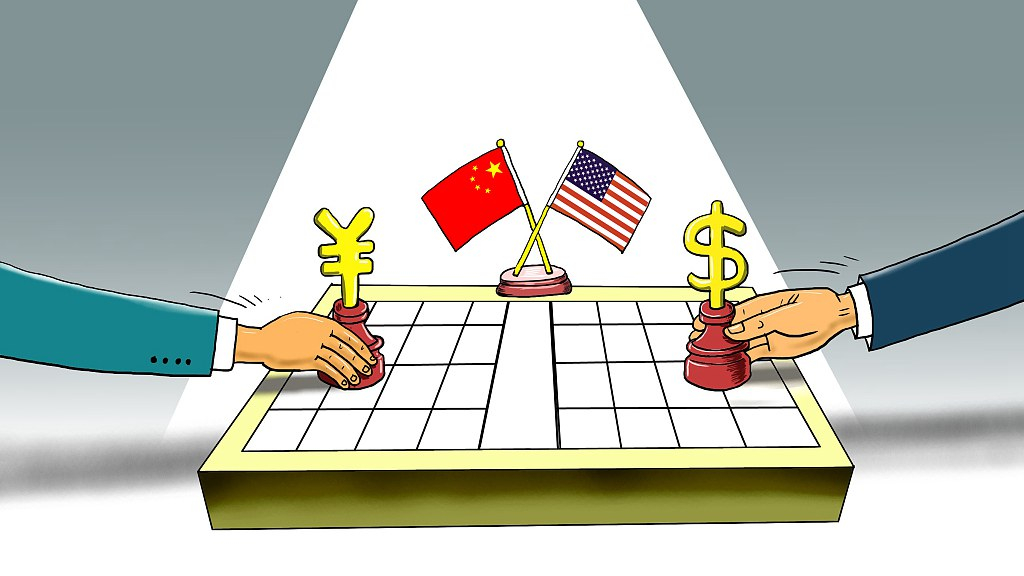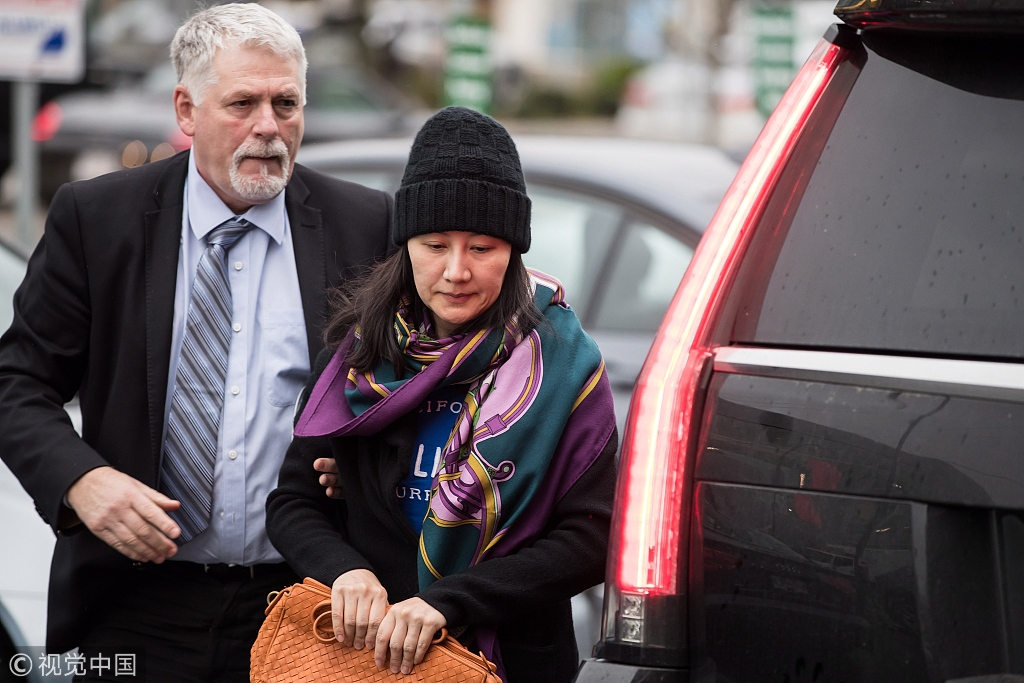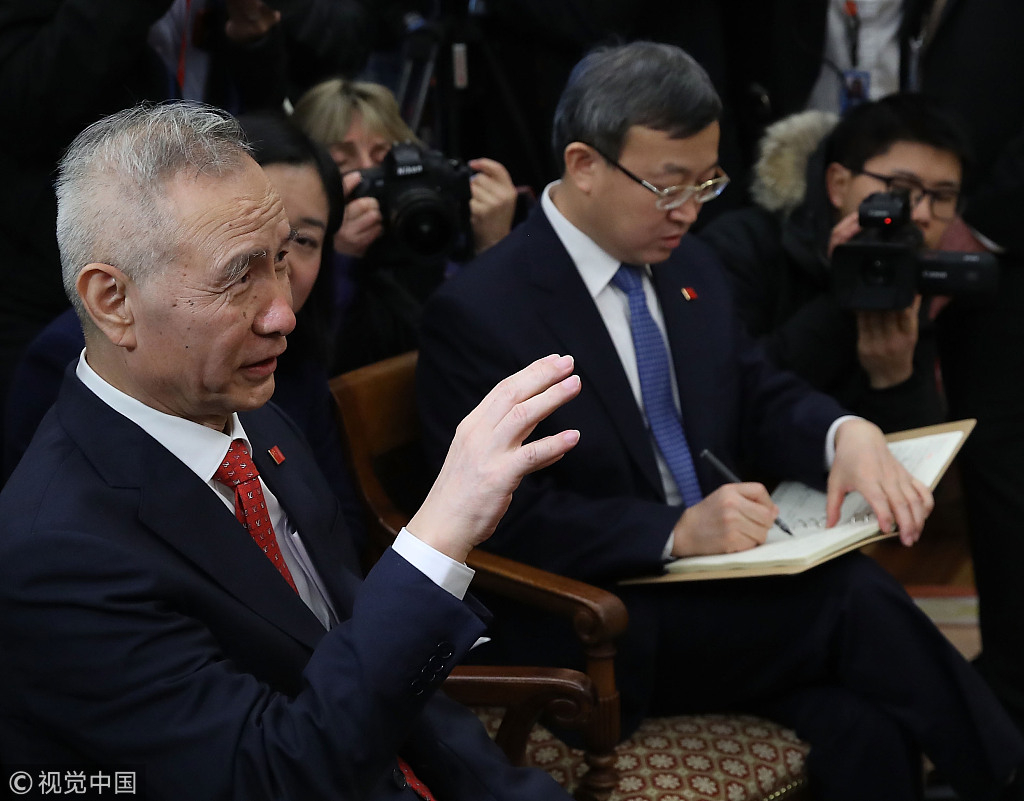
Opinion
09:12, 11-Feb-2019
Despite tough rhetoric, Trump desperate for a deal by March 1
Liu Jianxi

U.S. Trade Representative Robert Lighthizer and Treasury Secretary Steven Mnuchin are heading to China for a new round of trade talks, aiming to avert a March 1 increase in American tariffs on Chinese goods.
After months of on-again-off-again talks, the largest two economies are exchanging their sincerity and goodwill in clinching a fundamental deal. Apart from opening the door to imports of American rice, Beijing promised to review foreign investment laws and even set up an intellectual property rights court under the Supreme Court.
U.S. President Donald Trump has made frequent phone calls to Chinese President Xi Jinping since their G20 talks in December 2018. The president even pledged to intervene in the case against Huawei CFO Meng Wanzhou if it helps to avoid a further decline of Washington-Beijing relations.

Meng Wanzhou (R) arrives at a parole office with her private security guard in Vancouver, Canada, December 12, 2018. /VCG Photo
Meng Wanzhou (R) arrives at a parole office with her private security guard in Vancouver, Canada, December 12, 2018. /VCG Photo
In this context, the two sides conducted “very productive” trade talks in the last two months, paving the way for the latest round of negotiations. “We're putting in an enormous amount of effort to try to hit this deadline and get a deal,” Mnuchin was quoted by Reuters as saying.
As the turbulent market is anticipating for a prosperous China-U.S. relationship, Trump's capriciousness is casting a shadow on the prospect of it.
In less than a week after Chinese Vice Premier Liu He's Washington trip, the U.S. president retracted his words and confirmed to the press that he would not meet Xi before the March 1 deadline.
Undeniably, Trump has been acting waywardly on the trade issue. But this businessman-turned-politician is calculative enough to wield every possible tool to turn the situation into what would be in his benefit and has the basic intelligence to suit his actions to the times.
His denial to meet Xi is merely an attempt to win more leverage in trade negotiations. It is interesting to note that Trump affirmed the cancellation of the meeting with DPRK leader Kim Jong Un on May 24, just days before this historic talks took place in Singapore on June 12.

U.S. President Donald Trump (R) and DPRK leader Kim Jong Un shake hands during their historic summit in Singapore, June 12, 2018. /VCG Photo
U.S. President Donald Trump (R) and DPRK leader Kim Jong Un shake hands during their historic summit in Singapore, June 12, 2018. /VCG Photo
Domestic economic and political quagmires mean that the U.S. president has been left no alternative but to end the trade war at the earliest date. In its January report, Bank of America Corp. pointed out that any escalation of the fight “would be much more painful” for the United States, as the country has “limited room to loosen policy” both fiscally and monetarily.
In the meantime, the International Monetary Fund cut its forecast for the global economy for the second time in three months as a result of China-U.S. trade tensions.
Politically, as the Democrats clawed their way back to a majority in the House of Representatives, Democrat-GOP gridlock may become a regular event perplexing the Trump administration in the next two years before 2020 presidential election.
Terminating the trade war and easing tensions with the second largest economy is the easiest solution to Trump's squeezed political room and an effective card to boost Trump's chances of being re-elected.

Chinese Vice Premier Liu He speaks during a meeting with U.S. President Donald Trump in the Oval Office at the White House in Washington, January 31, 2019. /VCG Photo
Chinese Vice Premier Liu He speaks during a meeting with U.S. President Donald Trump in the Oval Office at the White House in Washington, January 31, 2019. /VCG Photo
Despite his tough rhetoric on China, Trump is like an ant on a hot pan desperate to withdraw from the fight that is dragging GOP and the United States into the economic and political moor.
Action explains everything. Trump is sending two groups of trade negotiators to China in just one month with a higher level and a larger scale.
Indeed, there are some distances between Washington's demands and the extent of Beijing's concessions on some fundamental issues, for instance, the structural reform.
Washington should be aware state control doesn't necessarily mean hostility to the open market, and there is no need to be too demanding on China's system.
It is high time that Washington stops thinking in terms of winning or losing, and take advantage of this round of talks to benefit the entire world.
(If you want to contribute and have specific expertise, please contact us at opinions@cgtn.com.)

SITEMAP
Copyright © 2018 CGTN. Beijing ICP prepared NO.16065310-3
Copyright © 2018 CGTN. Beijing ICP prepared NO.16065310-3